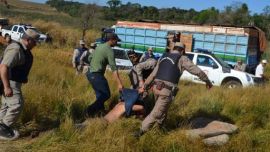Paraguay deploys army to quell land dispute
At least 17 killed in battles between police and farmers, prompting interior minister and chief of police to resign.

Paraguay has deployed its army to resolve a violent land dispute after 17 people were killed in gunbattles between police and landless farmers.
The victims were eight police officers and nine farmers in one of the worst such incidents in the country for two decades.
Keep reading
list of 4 itemsCanada wildfires spur evacuation orders, warnings: What you need to know
Evacuation orders issued as wildfire grows near Canada’s Alberta oil patch
Energy summit seeks to curb cooking habits that kill millions every year
The clash prompted Paraguayan President Fernando Lugo to accept the resignations of Carlos Filizzola, his interior minister, and Paulino Rojas, his chief of police, in an emergency cabinet meeting.
The violence broke out on Friday as police tried to evict about 150 farmers from a remote northern forest reserve, which is part of a huge estate owned by a Colorado Party politician opposed to Lugo, a former Roman Catholic bishop who spent years serving in the north of the country.
Lugo ruled out any links between the incident and the Paraguayan People’s Army, a small leftist group that has staged a series of raids on rural police posts in recent years.
The farmers shot at the officers when they arrived to evict them from a privately owned farm in the Canindeuyu district,
about 240km from the capital, Asuncion, and they returned fire, officials said.
Agrarian reform
The army chief said 150 soldiers had been sent to the rural area near the Brazilian border, dominated by sprawling soy
fields, cattle ranches and illegal marijuana plantations.
The roughly 2,000-hectare farm where the violence took place is owned by a local businessman who complained that a group of about 100 families had invaded his property about three weeks ago.
Campaigners for land rights say the land was distributed during the 35-year dictatorship of Alfredo Stroessner, when allies of his regime were rewarded with vast tracts of prime farmland in the landlocked nation of six million people.
Conflicts over land have increased in recent decades due partly to increased soybean farming in a country that was one of the world’s largest exporters of oilseed. Ranching has also spread into areas that used to be relatively free from large-scale agriculture.
One of Lugo’s election pledges was sweeping agrarian reform but his plans to redistribute land stalled as the state struggled to reach agreement between peasant farmers demanding specific tracts and landholders willing to sell them.
The opposition’s hold on congress has also complicated his reform agenda.